Advance Financial Accounting Report and Conceptual Framework
VerifiedAdded on 2021/05/31
|9
|1977
|474
Report
AI Summary
This report delves into advance financial accounting, examining the impact of financial reporting standards (IFRS) and the conceptual framework on financial statements. It critiques the complexities introduced by IFRS, particularly concerning the qualitative characteristics of financial information such as relevance, comparability, and understandability, and the impact on investors. The report further explores the potential amendment of the Corporation Act to include social and environmental responsibilities, analyzing this in the context of public interest, capture, and economic interest group theories. It also addresses the US Financial Accounting Standards Board's approach to non-current asset valuation, discussing the issues with impairment costs and the effects of not revaluing assets on shareholder wealth. The report concludes with a discussion on the reasons for not revaluing assets and the effects of such decisions.
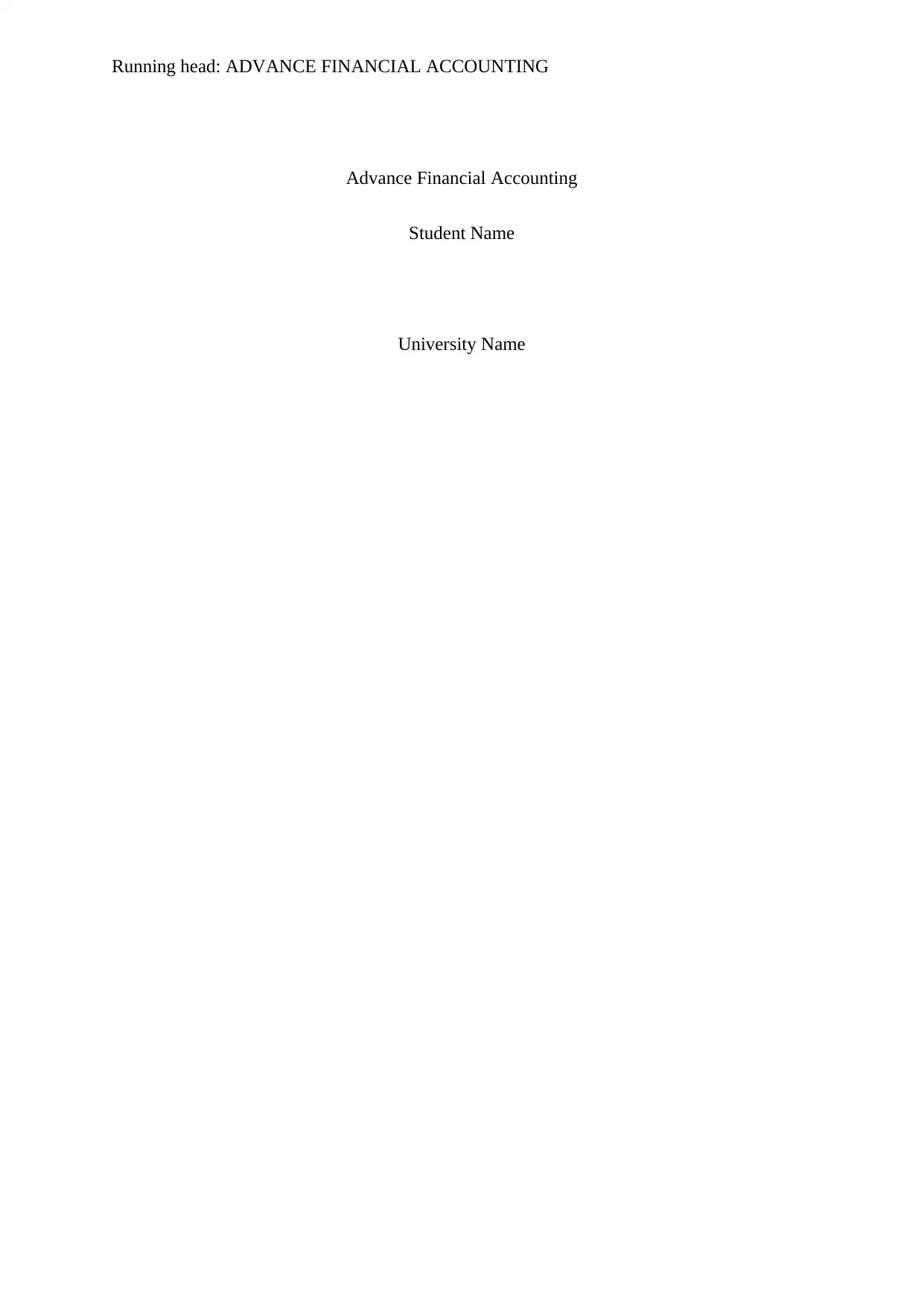
Running head: ADVANCE FINANCIAL ACCOUNTING
Advance Financial Accounting
Student Name
University Name
Advance Financial Accounting
Student Name
University Name
Paraphrase This Document
Need a fresh take? Get an instant paraphrase of this document with our AI Paraphraser

2ADVANCE FINANCIAL ACCOUNTING
Table of Contents
Answer to Question 1.................................................................................................................3
Answer to Question 2.................................................................................................................4
Question 3..................................................................................................................................6
Question 4..................................................................................................................................7
References..................................................................................................................................9
Table of Contents
Answer to Question 1.................................................................................................................3
Answer to Question 2.................................................................................................................4
Question 3..................................................................................................................................6
Question 4..................................................................................................................................7
References..................................................................................................................................9
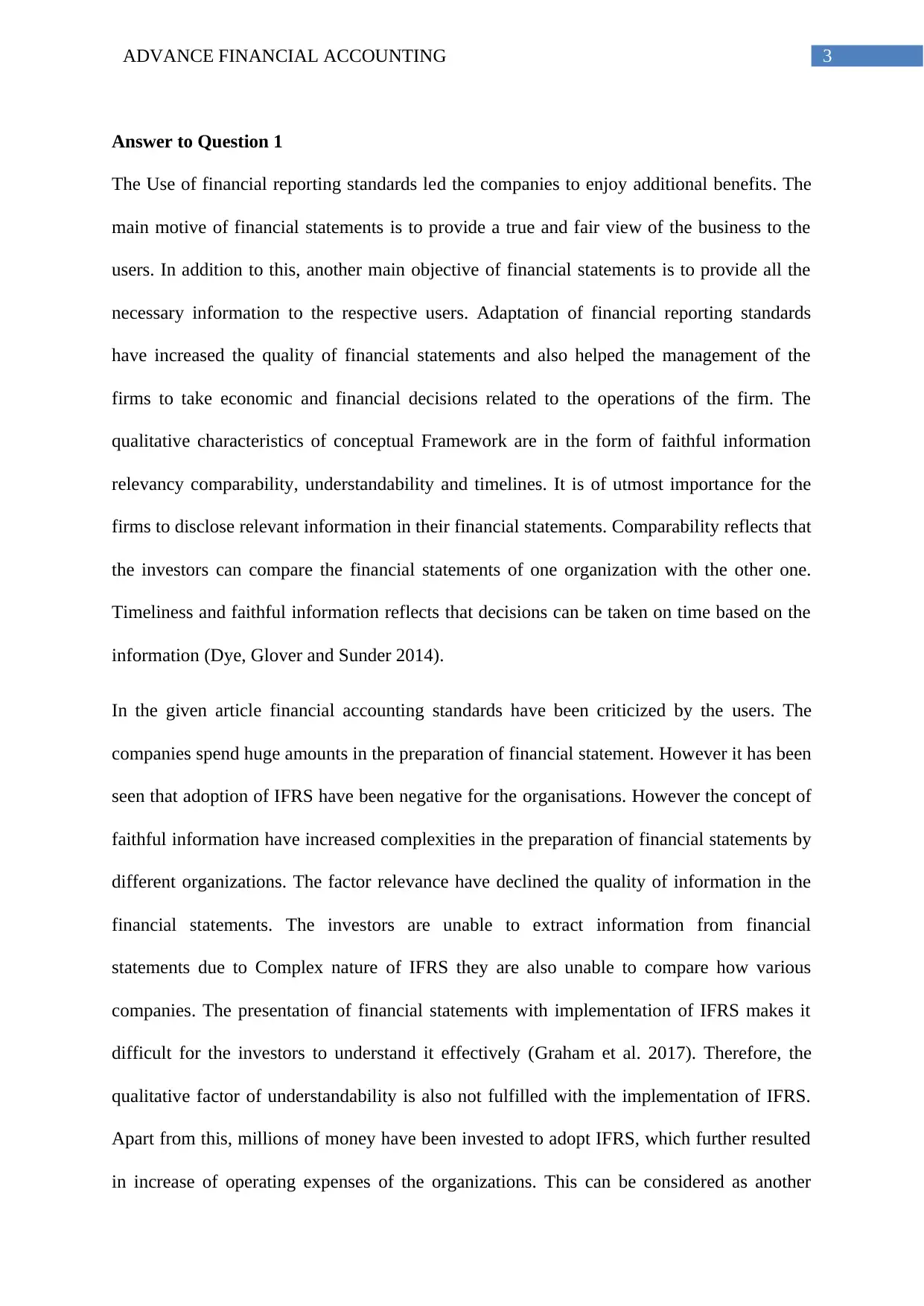
3ADVANCE FINANCIAL ACCOUNTING
Answer to Question 1
The Use of financial reporting standards led the companies to enjoy additional benefits. The
main motive of financial statements is to provide a true and fair view of the business to the
users. In addition to this, another main objective of financial statements is to provide all the
necessary information to the respective users. Adaptation of financial reporting standards
have increased the quality of financial statements and also helped the management of the
firms to take economic and financial decisions related to the operations of the firm. The
qualitative characteristics of conceptual Framework are in the form of faithful information
relevancy comparability, understandability and timelines. It is of utmost importance for the
firms to disclose relevant information in their financial statements. Comparability reflects that
the investors can compare the financial statements of one organization with the other one.
Timeliness and faithful information reflects that decisions can be taken on time based on the
information (Dye, Glover and Sunder 2014).
In the given article financial accounting standards have been criticized by the users. The
companies spend huge amounts in the preparation of financial statement. However it has been
seen that adoption of IFRS have been negative for the organisations. However the concept of
faithful information have increased complexities in the preparation of financial statements by
different organizations. The factor relevance have declined the quality of information in the
financial statements. The investors are unable to extract information from financial
statements due to Complex nature of IFRS they are also unable to compare how various
companies. The presentation of financial statements with implementation of IFRS makes it
difficult for the investors to understand it effectively (Graham et al. 2017). Therefore, the
qualitative factor of understandability is also not fulfilled with the implementation of IFRS.
Apart from this, millions of money have been invested to adopt IFRS, which further resulted
in increase of operating expenses of the organizations. This can be considered as another
Answer to Question 1
The Use of financial reporting standards led the companies to enjoy additional benefits. The
main motive of financial statements is to provide a true and fair view of the business to the
users. In addition to this, another main objective of financial statements is to provide all the
necessary information to the respective users. Adaptation of financial reporting standards
have increased the quality of financial statements and also helped the management of the
firms to take economic and financial decisions related to the operations of the firm. The
qualitative characteristics of conceptual Framework are in the form of faithful information
relevancy comparability, understandability and timelines. It is of utmost importance for the
firms to disclose relevant information in their financial statements. Comparability reflects that
the investors can compare the financial statements of one organization with the other one.
Timeliness and faithful information reflects that decisions can be taken on time based on the
information (Dye, Glover and Sunder 2014).
In the given article financial accounting standards have been criticized by the users. The
companies spend huge amounts in the preparation of financial statement. However it has been
seen that adoption of IFRS have been negative for the organisations. However the concept of
faithful information have increased complexities in the preparation of financial statements by
different organizations. The factor relevance have declined the quality of information in the
financial statements. The investors are unable to extract information from financial
statements due to Complex nature of IFRS they are also unable to compare how various
companies. The presentation of financial statements with implementation of IFRS makes it
difficult for the investors to understand it effectively (Graham et al. 2017). Therefore, the
qualitative factor of understandability is also not fulfilled with the implementation of IFRS.
Apart from this, millions of money have been invested to adopt IFRS, which further resulted
in increase of operating expenses of the organizations. This can be considered as another
⊘ This is a preview!⊘
Do you want full access?
Subscribe today to unlock all pages.

Trusted by 1+ million students worldwide
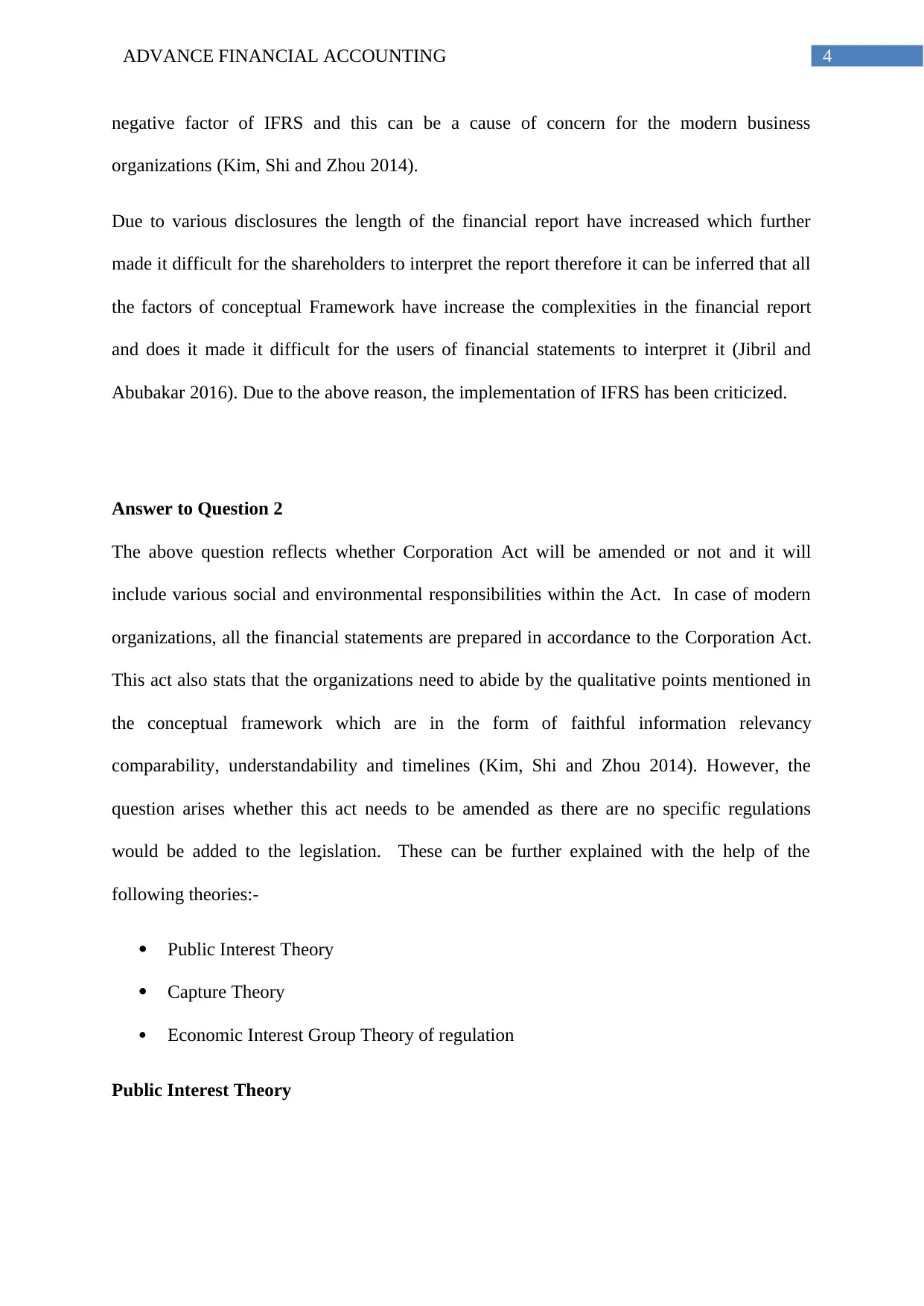
4ADVANCE FINANCIAL ACCOUNTING
negative factor of IFRS and this can be a cause of concern for the modern business
organizations (Kim, Shi and Zhou 2014).
Due to various disclosures the length of the financial report have increased which further
made it difficult for the shareholders to interpret the report therefore it can be inferred that all
the factors of conceptual Framework have increase the complexities in the financial report
and does it made it difficult for the users of financial statements to interpret it (Jibril and
Abubakar 2016). Due to the above reason, the implementation of IFRS has been criticized.
Answer to Question 2
The above question reflects whether Corporation Act will be amended or not and it will
include various social and environmental responsibilities within the Act. In case of modern
organizations, all the financial statements are prepared in accordance to the Corporation Act.
This act also stats that the organizations need to abide by the qualitative points mentioned in
the conceptual framework which are in the form of faithful information relevancy
comparability, understandability and timelines (Kim, Shi and Zhou 2014). However, the
question arises whether this act needs to be amended as there are no specific regulations
would be added to the legislation. These can be further explained with the help of the
following theories:-
Public Interest Theory
Capture Theory
Economic Interest Group Theory of regulation
Public Interest Theory
negative factor of IFRS and this can be a cause of concern for the modern business
organizations (Kim, Shi and Zhou 2014).
Due to various disclosures the length of the financial report have increased which further
made it difficult for the shareholders to interpret the report therefore it can be inferred that all
the factors of conceptual Framework have increase the complexities in the financial report
and does it made it difficult for the users of financial statements to interpret it (Jibril and
Abubakar 2016). Due to the above reason, the implementation of IFRS has been criticized.
Answer to Question 2
The above question reflects whether Corporation Act will be amended or not and it will
include various social and environmental responsibilities within the Act. In case of modern
organizations, all the financial statements are prepared in accordance to the Corporation Act.
This act also stats that the organizations need to abide by the qualitative points mentioned in
the conceptual framework which are in the form of faithful information relevancy
comparability, understandability and timelines (Kim, Shi and Zhou 2014). However, the
question arises whether this act needs to be amended as there are no specific regulations
would be added to the legislation. These can be further explained with the help of the
following theories:-
Public Interest Theory
Capture Theory
Economic Interest Group Theory of regulation
Public Interest Theory
Paraphrase This Document
Need a fresh take? Get an instant paraphrase of this document with our AI Paraphraser
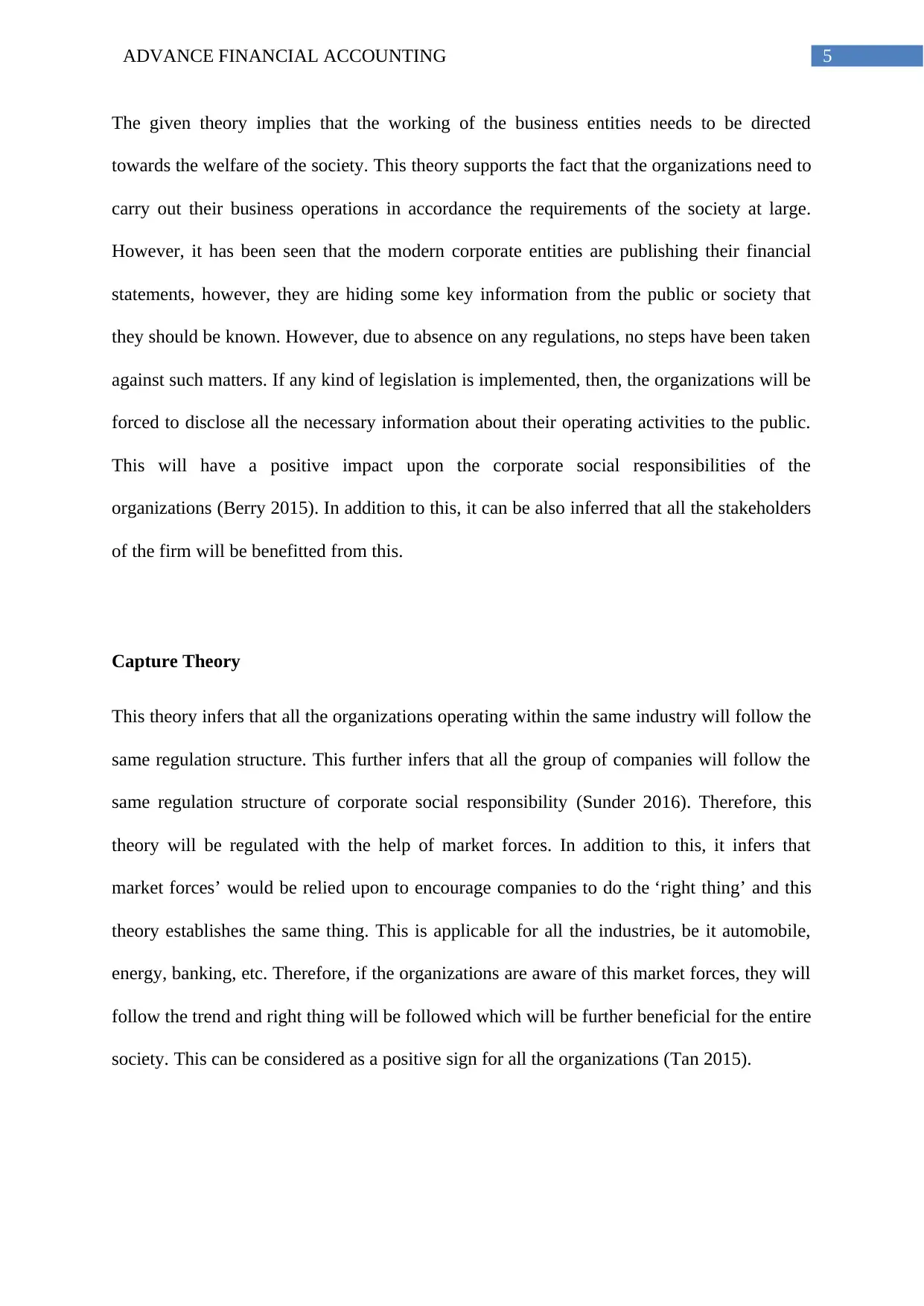
5ADVANCE FINANCIAL ACCOUNTING
The given theory implies that the working of the business entities needs to be directed
towards the welfare of the society. This theory supports the fact that the organizations need to
carry out their business operations in accordance the requirements of the society at large.
However, it has been seen that the modern corporate entities are publishing their financial
statements, however, they are hiding some key information from the public or society that
they should be known. However, due to absence on any regulations, no steps have been taken
against such matters. If any kind of legislation is implemented, then, the organizations will be
forced to disclose all the necessary information about their operating activities to the public.
This will have a positive impact upon the corporate social responsibilities of the
organizations (Berry 2015). In addition to this, it can be also inferred that all the stakeholders
of the firm will be benefitted from this.
Capture Theory
This theory infers that all the organizations operating within the same industry will follow the
same regulation structure. This further infers that all the group of companies will follow the
same regulation structure of corporate social responsibility (Sunder 2016). Therefore, this
theory will be regulated with the help of market forces. In addition to this, it infers that
market forces’ would be relied upon to encourage companies to do the ‘right thing’ and this
theory establishes the same thing. This is applicable for all the industries, be it automobile,
energy, banking, etc. Therefore, if the organizations are aware of this market forces, they will
follow the trend and right thing will be followed which will be further beneficial for the entire
society. This can be considered as a positive sign for all the organizations (Tan 2015).
The given theory implies that the working of the business entities needs to be directed
towards the welfare of the society. This theory supports the fact that the organizations need to
carry out their business operations in accordance the requirements of the society at large.
However, it has been seen that the modern corporate entities are publishing their financial
statements, however, they are hiding some key information from the public or society that
they should be known. However, due to absence on any regulations, no steps have been taken
against such matters. If any kind of legislation is implemented, then, the organizations will be
forced to disclose all the necessary information about their operating activities to the public.
This will have a positive impact upon the corporate social responsibilities of the
organizations (Berry 2015). In addition to this, it can be also inferred that all the stakeholders
of the firm will be benefitted from this.
Capture Theory
This theory infers that all the organizations operating within the same industry will follow the
same regulation structure. This further infers that all the group of companies will follow the
same regulation structure of corporate social responsibility (Sunder 2016). Therefore, this
theory will be regulated with the help of market forces. In addition to this, it infers that
market forces’ would be relied upon to encourage companies to do the ‘right thing’ and this
theory establishes the same thing. This is applicable for all the industries, be it automobile,
energy, banking, etc. Therefore, if the organizations are aware of this market forces, they will
follow the trend and right thing will be followed which will be further beneficial for the entire
society. This can be considered as a positive sign for all the organizations (Tan 2015).
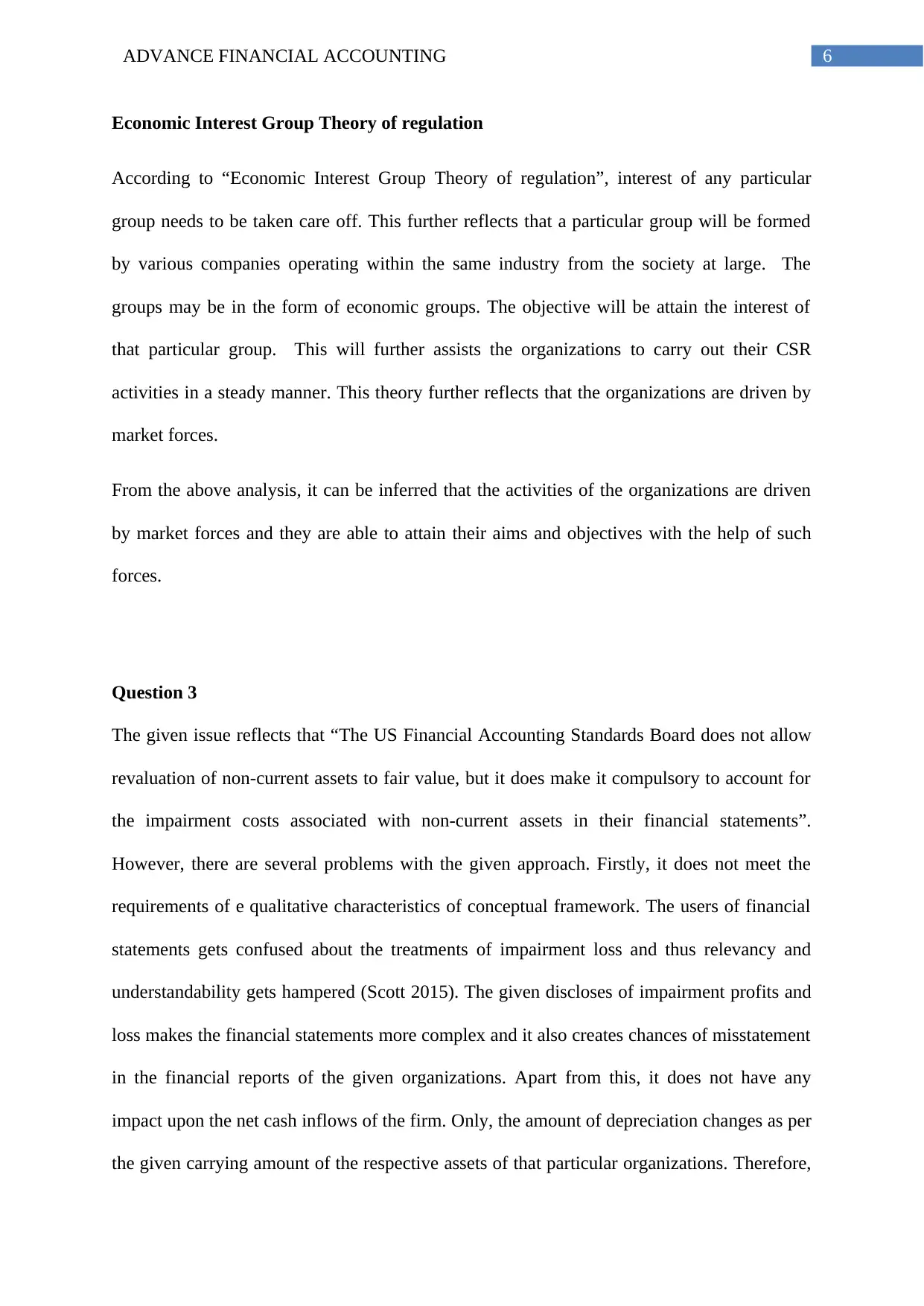
6ADVANCE FINANCIAL ACCOUNTING
Economic Interest Group Theory of regulation
According to “Economic Interest Group Theory of regulation”, interest of any particular
group needs to be taken care off. This further reflects that a particular group will be formed
by various companies operating within the same industry from the society at large. The
groups may be in the form of economic groups. The objective will be attain the interest of
that particular group. This will further assists the organizations to carry out their CSR
activities in a steady manner. This theory further reflects that the organizations are driven by
market forces.
From the above analysis, it can be inferred that the activities of the organizations are driven
by market forces and they are able to attain their aims and objectives with the help of such
forces.
Question 3
The given issue reflects that “The US Financial Accounting Standards Board does not allow
revaluation of non-current assets to fair value, but it does make it compulsory to account for
the impairment costs associated with non-current assets in their financial statements”.
However, there are several problems with the given approach. Firstly, it does not meet the
requirements of e qualitative characteristics of conceptual framework. The users of financial
statements gets confused about the treatments of impairment loss and thus relevancy and
understandability gets hampered (Scott 2015). The given discloses of impairment profits and
loss makes the financial statements more complex and it also creates chances of misstatement
in the financial reports of the given organizations. Apart from this, it does not have any
impact upon the net cash inflows of the firm. Only, the amount of depreciation changes as per
the given carrying amount of the respective assets of that particular organizations. Therefore,
Economic Interest Group Theory of regulation
According to “Economic Interest Group Theory of regulation”, interest of any particular
group needs to be taken care off. This further reflects that a particular group will be formed
by various companies operating within the same industry from the society at large. The
groups may be in the form of economic groups. The objective will be attain the interest of
that particular group. This will further assists the organizations to carry out their CSR
activities in a steady manner. This theory further reflects that the organizations are driven by
market forces.
From the above analysis, it can be inferred that the activities of the organizations are driven
by market forces and they are able to attain their aims and objectives with the help of such
forces.
Question 3
The given issue reflects that “The US Financial Accounting Standards Board does not allow
revaluation of non-current assets to fair value, but it does make it compulsory to account for
the impairment costs associated with non-current assets in their financial statements”.
However, there are several problems with the given approach. Firstly, it does not meet the
requirements of e qualitative characteristics of conceptual framework. The users of financial
statements gets confused about the treatments of impairment loss and thus relevancy and
understandability gets hampered (Scott 2015). The given discloses of impairment profits and
loss makes the financial statements more complex and it also creates chances of misstatement
in the financial reports of the given organizations. Apart from this, it does not have any
impact upon the net cash inflows of the firm. Only, the amount of depreciation changes as per
the given carrying amount of the respective assets of that particular organizations. Therefore,
⊘ This is a preview!⊘
Do you want full access?
Subscribe today to unlock all pages.

Trusted by 1+ million students worldwide
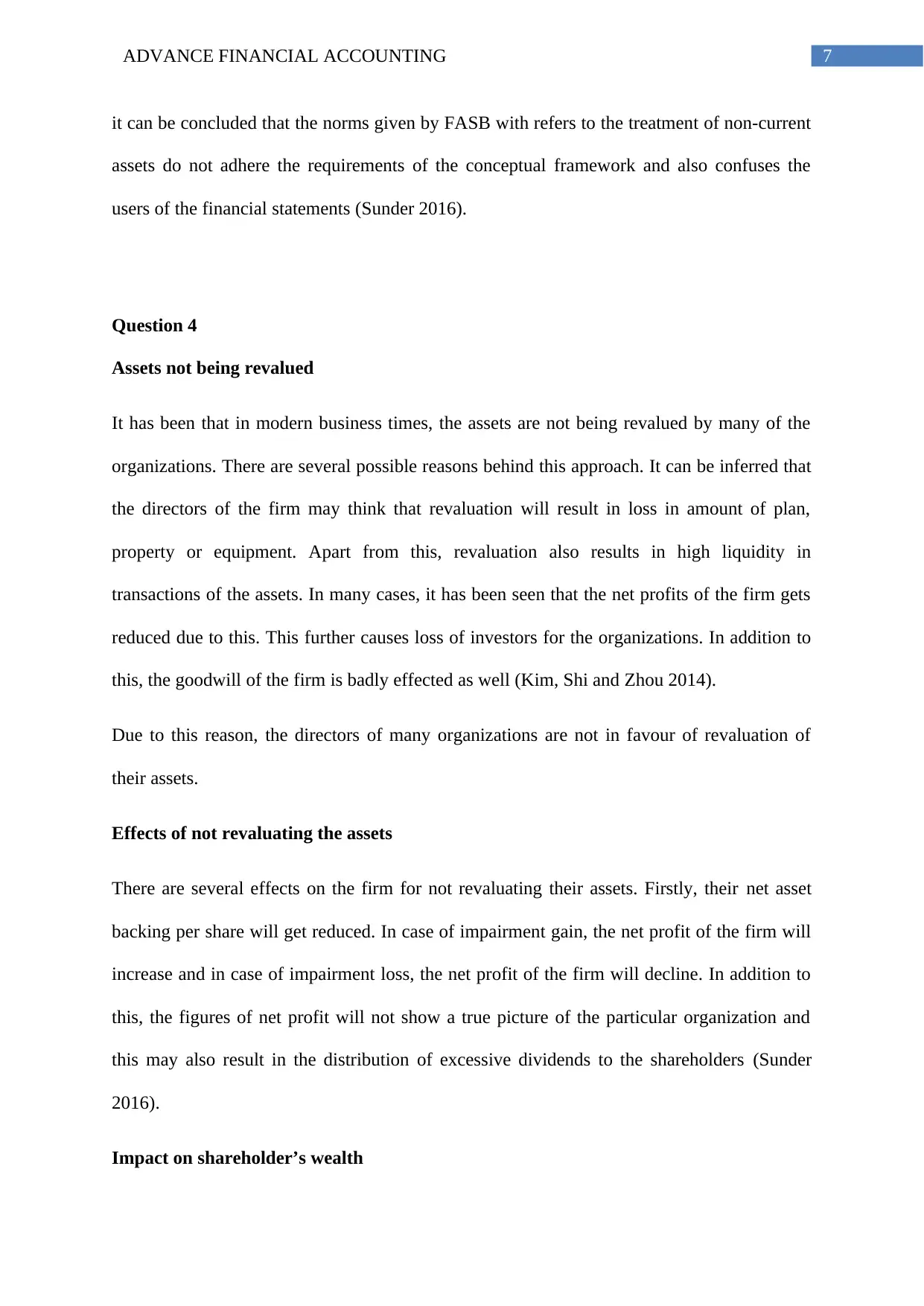
7ADVANCE FINANCIAL ACCOUNTING
it can be concluded that the norms given by FASB with refers to the treatment of non-current
assets do not adhere the requirements of the conceptual framework and also confuses the
users of the financial statements (Sunder 2016).
Question 4
Assets not being revalued
It has been that in modern business times, the assets are not being revalued by many of the
organizations. There are several possible reasons behind this approach. It can be inferred that
the directors of the firm may think that revaluation will result in loss in amount of plan,
property or equipment. Apart from this, revaluation also results in high liquidity in
transactions of the assets. In many cases, it has been seen that the net profits of the firm gets
reduced due to this. This further causes loss of investors for the organizations. In addition to
this, the goodwill of the firm is badly effected as well (Kim, Shi and Zhou 2014).
Due to this reason, the directors of many organizations are not in favour of revaluation of
their assets.
Effects of not revaluating the assets
There are several effects on the firm for not revaluating their assets. Firstly, their net asset
backing per share will get reduced. In case of impairment gain, the net profit of the firm will
increase and in case of impairment loss, the net profit of the firm will decline. In addition to
this, the figures of net profit will not show a true picture of the particular organization and
this may also result in the distribution of excessive dividends to the shareholders (Sunder
2016).
Impact on shareholder’s wealth
it can be concluded that the norms given by FASB with refers to the treatment of non-current
assets do not adhere the requirements of the conceptual framework and also confuses the
users of the financial statements (Sunder 2016).
Question 4
Assets not being revalued
It has been that in modern business times, the assets are not being revalued by many of the
organizations. There are several possible reasons behind this approach. It can be inferred that
the directors of the firm may think that revaluation will result in loss in amount of plan,
property or equipment. Apart from this, revaluation also results in high liquidity in
transactions of the assets. In many cases, it has been seen that the net profits of the firm gets
reduced due to this. This further causes loss of investors for the organizations. In addition to
this, the goodwill of the firm is badly effected as well (Kim, Shi and Zhou 2014).
Due to this reason, the directors of many organizations are not in favour of revaluation of
their assets.
Effects of not revaluating the assets
There are several effects on the firm for not revaluating their assets. Firstly, their net asset
backing per share will get reduced. In case of impairment gain, the net profit of the firm will
increase and in case of impairment loss, the net profit of the firm will decline. In addition to
this, the figures of net profit will not show a true picture of the particular organization and
this may also result in the distribution of excessive dividends to the shareholders (Sunder
2016).
Impact on shareholder’s wealth
Paraphrase This Document
Need a fresh take? Get an instant paraphrase of this document with our AI Paraphraser
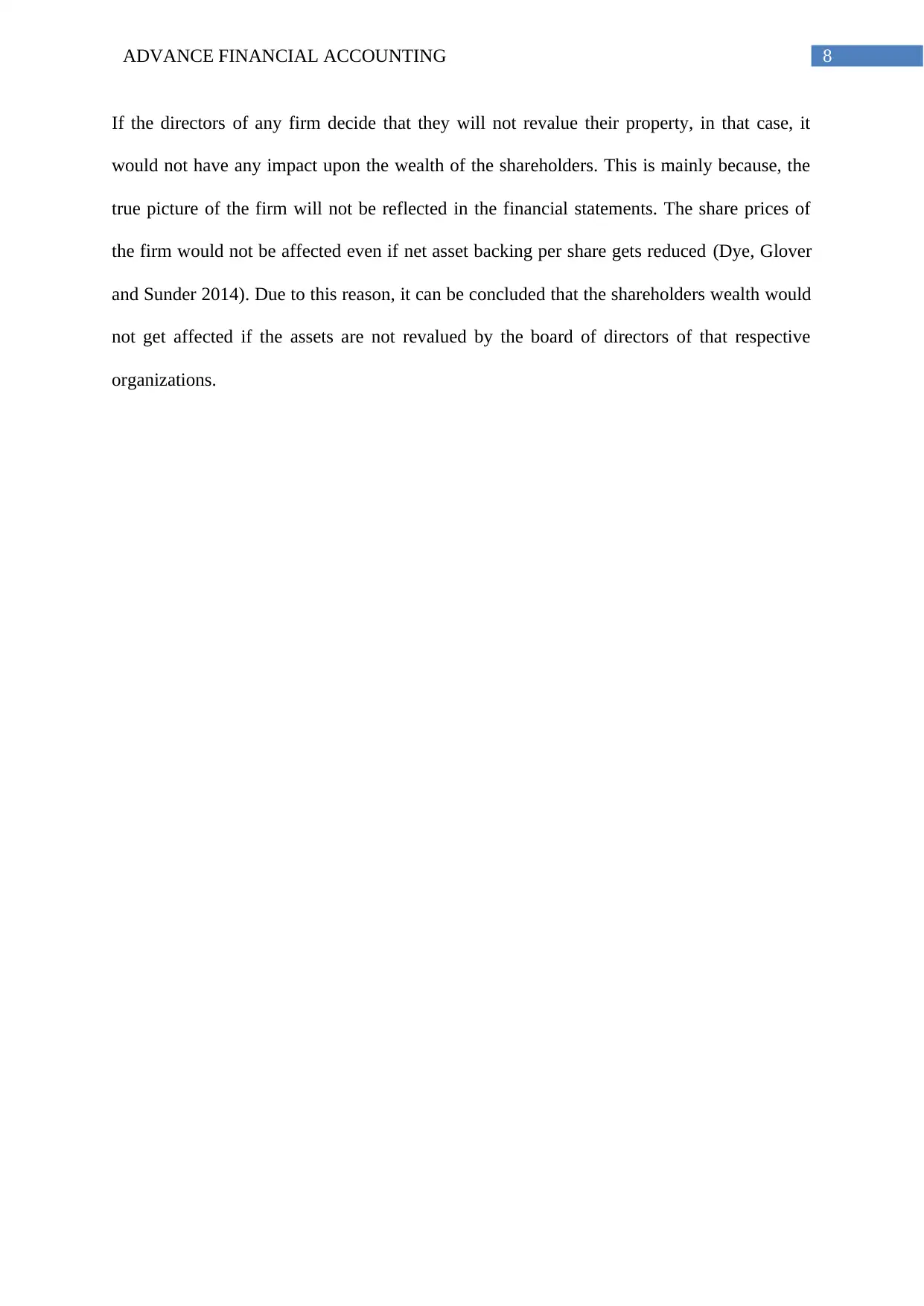
8ADVANCE FINANCIAL ACCOUNTING
If the directors of any firm decide that they will not revalue their property, in that case, it
would not have any impact upon the wealth of the shareholders. This is mainly because, the
true picture of the firm will not be reflected in the financial statements. The share prices of
the firm would not be affected even if net asset backing per share gets reduced (Dye, Glover
and Sunder 2014). Due to this reason, it can be concluded that the shareholders wealth would
not get affected if the assets are not revalued by the board of directors of that respective
organizations.
If the directors of any firm decide that they will not revalue their property, in that case, it
would not have any impact upon the wealth of the shareholders. This is mainly because, the
true picture of the firm will not be reflected in the financial statements. The share prices of
the firm would not be affected even if net asset backing per share gets reduced (Dye, Glover
and Sunder 2014). Due to this reason, it can be concluded that the shareholders wealth would
not get affected if the assets are not revalued by the board of directors of that respective
organizations.
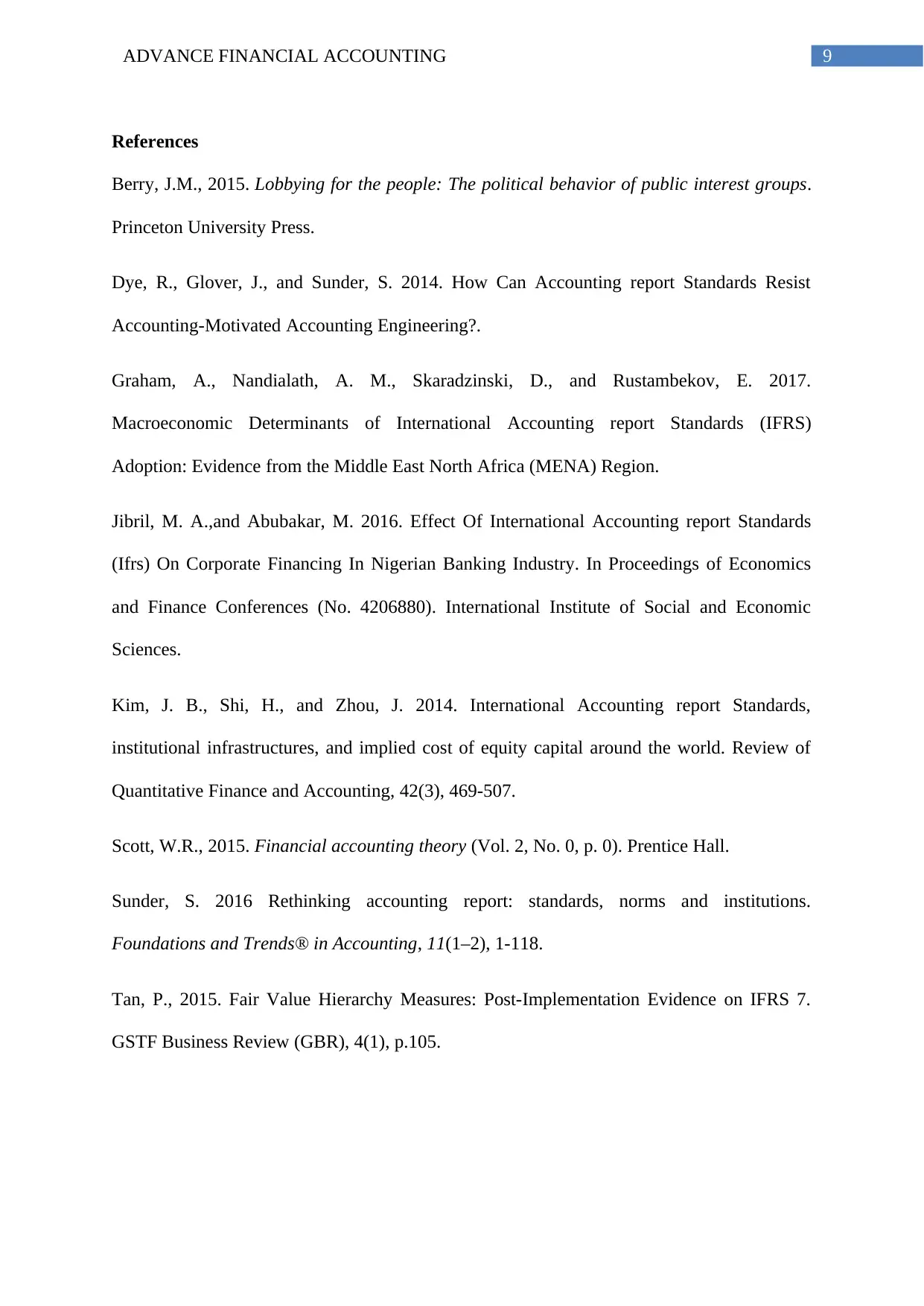
9ADVANCE FINANCIAL ACCOUNTING
References
Berry, J.M., 2015. Lobbying for the people: The political behavior of public interest groups.
Princeton University Press.
Dye, R., Glover, J., and Sunder, S. 2014. How Can Accounting report Standards Resist
Accounting-Motivated Accounting Engineering?.
Graham, A., Nandialath, A. M., Skaradzinski, D., and Rustambekov, E. 2017.
Macroeconomic Determinants of International Accounting report Standards (IFRS)
Adoption: Evidence from the Middle East North Africa (MENA) Region.
Jibril, M. A.,and Abubakar, M. 2016. Effect Of International Accounting report Standards
(Ifrs) On Corporate Financing In Nigerian Banking Industry. In Proceedings of Economics
and Finance Conferences (No. 4206880). International Institute of Social and Economic
Sciences.
Kim, J. B., Shi, H., and Zhou, J. 2014. International Accounting report Standards,
institutional infrastructures, and implied cost of equity capital around the world. Review of
Quantitative Finance and Accounting, 42(3), 469-507.
Scott, W.R., 2015. Financial accounting theory (Vol. 2, No. 0, p. 0). Prentice Hall.
Sunder, S. 2016 Rethinking accounting report: standards, norms and institutions.
Foundations and Trends® in Accounting, 11(1–2), 1-118.
Tan, P., 2015. Fair Value Hierarchy Measures: Post-Implementation Evidence on IFRS 7.
GSTF Business Review (GBR), 4(1), p.105.
References
Berry, J.M., 2015. Lobbying for the people: The political behavior of public interest groups.
Princeton University Press.
Dye, R., Glover, J., and Sunder, S. 2014. How Can Accounting report Standards Resist
Accounting-Motivated Accounting Engineering?.
Graham, A., Nandialath, A. M., Skaradzinski, D., and Rustambekov, E. 2017.
Macroeconomic Determinants of International Accounting report Standards (IFRS)
Adoption: Evidence from the Middle East North Africa (MENA) Region.
Jibril, M. A.,and Abubakar, M. 2016. Effect Of International Accounting report Standards
(Ifrs) On Corporate Financing In Nigerian Banking Industry. In Proceedings of Economics
and Finance Conferences (No. 4206880). International Institute of Social and Economic
Sciences.
Kim, J. B., Shi, H., and Zhou, J. 2014. International Accounting report Standards,
institutional infrastructures, and implied cost of equity capital around the world. Review of
Quantitative Finance and Accounting, 42(3), 469-507.
Scott, W.R., 2015. Financial accounting theory (Vol. 2, No. 0, p. 0). Prentice Hall.
Sunder, S. 2016 Rethinking accounting report: standards, norms and institutions.
Foundations and Trends® in Accounting, 11(1–2), 1-118.
Tan, P., 2015. Fair Value Hierarchy Measures: Post-Implementation Evidence on IFRS 7.
GSTF Business Review (GBR), 4(1), p.105.
⊘ This is a preview!⊘
Do you want full access?
Subscribe today to unlock all pages.

Trusted by 1+ million students worldwide
1 out of 9
Related Documents
Your All-in-One AI-Powered Toolkit for Academic Success.
+13062052269
info@desklib.com
Available 24*7 on WhatsApp / Email
![[object Object]](/_next/static/media/star-bottom.7253800d.svg)
Unlock your academic potential
Copyright © 2020–2026 A2Z Services. All Rights Reserved. Developed and managed by ZUCOL.



